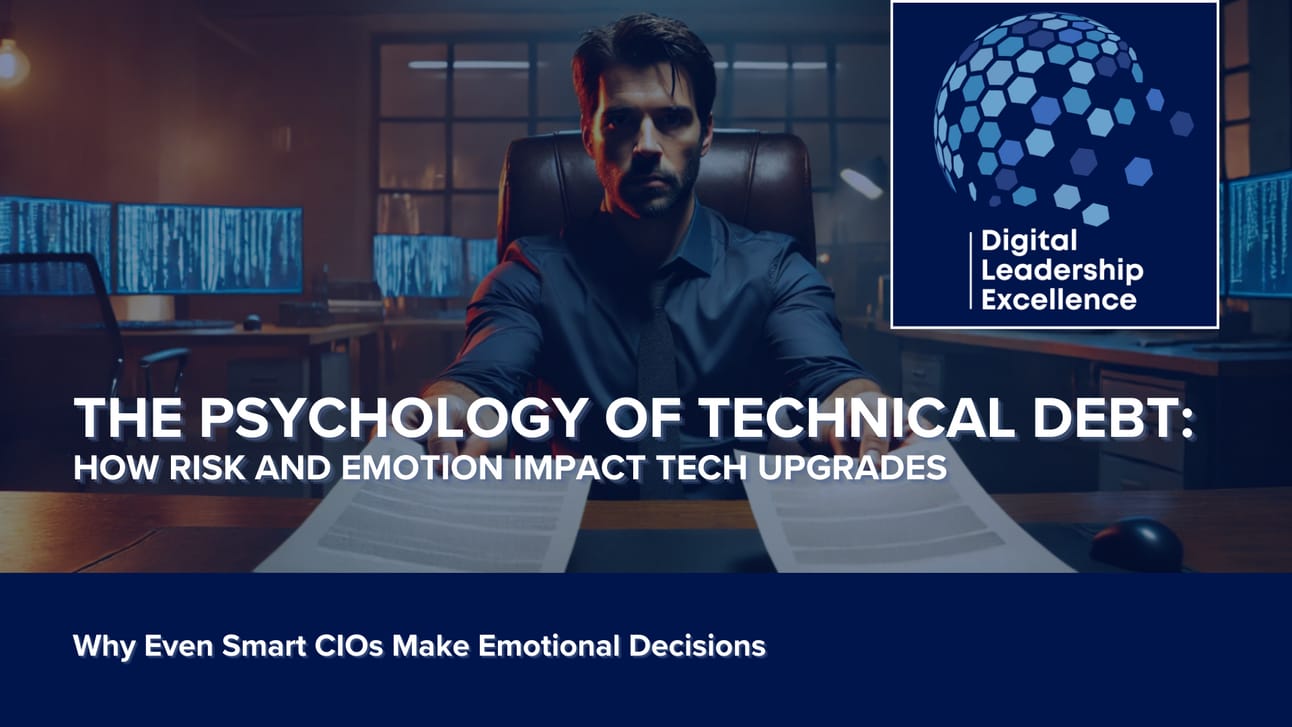Greetings, and welcome to Digital Leadership Excellence—your trusted weekly guide to excelling in tech leadership, delivering results, and thriving with clarity and purpose. In every issue, we provide insights into winning strategies, growth tactics, and practical solutions, designed to support both current and aspiring technology leaders navigating the ever-evolving digital world.
1.0 Introduction
I've led teams that delivered millions in cost savings through optimizing technical architectures and IT investments: Here's what I learned about technical debt that most CIOs miss completely.
There's a whole psychology around technical debt.
So, let's talk about what's really keeping you up at night...
You're sitting on a mountain of technical debt. Your legacy systems are holding you back. You KNOW you need to modernize. Yet somehow, every modernization initiative feels like pushing a boulder uphill.
Sound familiar?
Today, I'm going to share insights that will fundamentally change how you think about technical debt. But first, let me tell you a story...
I remember working with a technology leader at a large systems integrator. She had been trying for YEARS to get approval for a critical systems modernization project.
"I've shown them the numbers," she told me. "The ROI is clear. The technical benefits are obvious. But I can't seem to get traction."
That's when I asked her a question that changed everything:
"What thoughts come up for you when you think about this project?"
First she looked at me like I had three heads…and then she mumbled something about therapy.
But then something fascinating happened...
She started talking about her FEAR. Fear of disrupting current operations. Fear of project failure. Fear of damaging her reputation if things went wrong.
And that's when it hit her - if SHE was experiencing fear, what were her stakeholders feeling?
This realization led to a complete transformation in her approach. Instead of focusing on technical specifications and ROI calculations, she started addressing the psychological undercurrent driving resistance to change.

2.0 What You Need to Know
Here's what most technical leaders miss: Technical debt isn't just a technical problem. It's a PSYCHOLOGICAL one as well.
Let me break this down...
Fear Factor - Your brain is hardwired to avoid risk. When faced with a major modernization decision, your amygdala (the fear center of your brain) kicks into overdrive. It's not just calculating risks - it's triggering survival instincts.
Loss Aversion - Biased Research shows we feel losses about twice as strongly as equivalent gains. This means your stakeholders are naturally more focused on what they might LOSE in a modernization effort than what they might gain.
Status Quo Bias - Our brains are literally wired to prefer things as they are. This isn't laziness - it's a fundamental feature of human psychology. Even when we know change is necessary, we resist it.
3.0 The Hidden Psychological Landscape
Here's what this looks like in practice:
When your CFO says "We need more data," they're often really saying "I'm scared of making a costly mistake."
When your operations team says "The timing isn't right," they're really saying "We're comfortable with what we know."
When your board says "Let's revisit this next quarter," they're really saying "This feels too risky right now."
Understanding this landscape is CRUCIAL. But it's just the beginning…

4.0 The Transformation Framework
Let me share a framework that helped the one mentioned above secure full funding for her modernization initiative - and more importantly, how YOU can use it.
4.1 The Technical Debt Emotional Intelligence (TDEI) Framework
Start by mapping the psychology. For each stakeholder group, ask:
What are their biggest fears?
What do they stand to lose?
What's their emotional investment in the current system?
Our leader discovered that her board wasn't resistant to modernization - they were anxious about business disruption. Big difference.
Reframe the Narrative Stop talking about technical debt as a purely technical problem. Instead:
Connect it to human experiences
Tell stories about impact
Make the invisible visible
Our leader started her board presentation with customer journey maps showing emotional pain points caused by legacy systems. It was a game-changer.
Create an environment where concerns can be openly expressed:
Acknowledge fears explicitly
Share your own vulnerabilities
Create safe spaces for doubt
Leverage Positive Psychology Instead of focusing on problems, highlight opportunities:
Paint a vivid picture of the future
Celebrate small wins
Create momentum through early success
The results speak for themselves. Using this framework, the executive in question didn't just get her modernization project approved. She transformed how her organization thinks about technical debt.
Key outcomes:
Full funding approved
Stronger stakeholder relationships
Increased team confidence
Accelerated decision-making
But here's the REALLY interesting part...
By addressing the psychological aspects of technical debt, she found that the technical solutions became easier to implement. Why? Because she had everyone's emotional buy-in.

4.2 Practical Steps You Can Take Today
Start with Self-Awareness
What emotions come up when you think about your technical debt?
How does this psychology influence your decisions?
Where might you be letting fear drive your strategy?
Map Your Stakeholders' psychological landscape
Who has emotional investment in current systems?
What are their unspoken fears?
Where might resistance really be coming from?
Transform Your Communication
Instead of saying: "We need to modernize our legacy systems to reduce technical debt." Try: "We have an opportunity to remove friction from our customer experience and empower our teams to innovate."
5.0 The Path Forward
Technical debt isn't going away. But your approach to managing it can transform.
Start seeing technical debt through the lens of human psychology, and you'll unlock new possibilities for driving change.
Remember: The most successful tech leaders aren't just technical experts - they're emotional intelligence masters.
Ready to transform how you think about technical debt? Drop a comment below with your biggest insight from this newsletter.
And if you'd like to dive deeper into the framework - ping me and we’ll talk.



